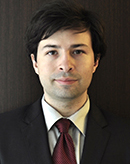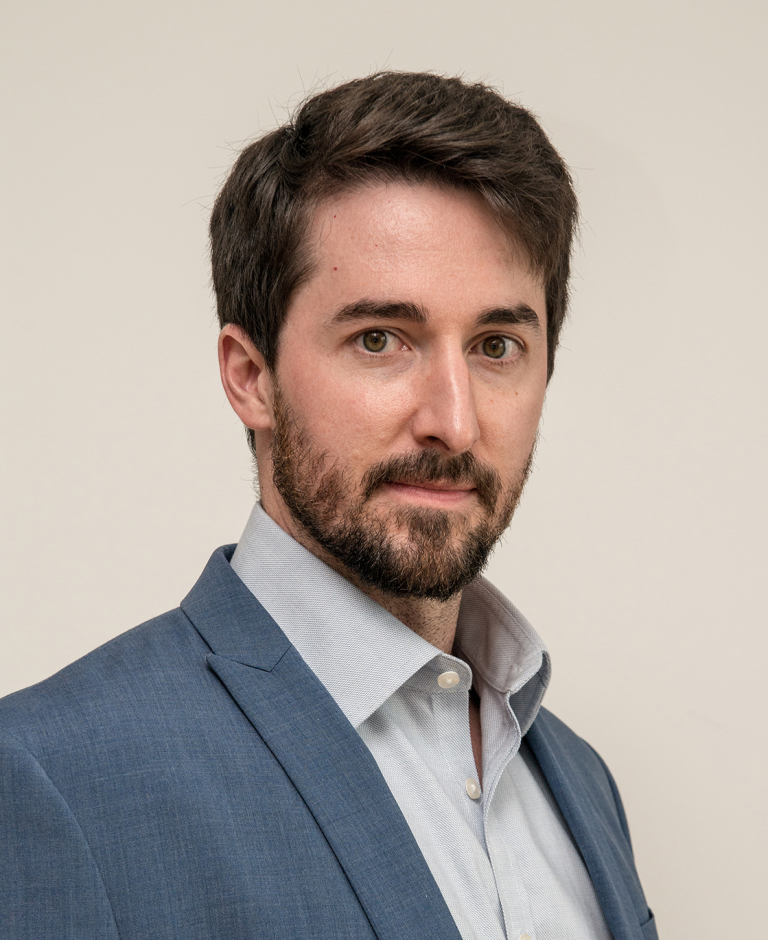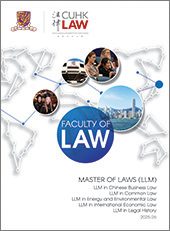Master of Laws (LLM) in Legal History
From 2022-23, CUHK LAW will offer a brand-new LLM in Legal History Programme. This LLM—one of the only such programmes globally—is designed to equip students with expertise in both the substance and the methodology of transnational legal history research. The LLM in Legal History is an elite programme which admits only a small number of high-quality students. Unlike traditional taught postgraduate programmes, the LLM in Legal History has a hybrid structure, combining classroom learning and research elements. In addition to their classes, students will complete a substantial research project under the supervision of a member of the faculty, accounting for half of their credits. Through their involvement in the programme students will acquire substantial research, writing and presentation skills, paving the way to successful academic, policy and practice careers.
Deputy Programme Director (LLM Legal History)
| Medium of instruction: | English | ||||||||||||||||||
| How and when to apply: | Applications for 2026 intake will be invited around September of this year. | ||||||||||||||||||
| Admission requirements: | All applicants must fulfill the General Admission Requirements and the English Language Proficiency Requirement prescribed by the University’s In addition applicants must have:
As many areas of professional activity are related to law, we also welcome applications from applicants who work in the areas of media, education, public service, and similar relevant fields. Applicants whose undergraduate studies were not conducted and assessed in English are required to take an appropriate English language proficiency test and achieve a sufficient score, such as a score of 570 or above in TOEFL (Paper Based Test), 88 or above in TOEFL (Internet Based Test); Band 6.5 or better in IELTS; or equivalent. The test results must be obtained not more than two years prior to the date of applying to join the LLM Programme. | ||||||||||||||||||
| Duration: | Full-time: one year (normative study period) – two years (maximum study period). Part-time: two years (normative study period) – three years (maximum study period). | ||||||||||||||||||
| Campus: | The CUHK Graduate Law Centre, 2/F, Bank of America Tower, Central. | ||||||||||||||||||
| Programme requirements: | 24 units: including 15 units of required courses and 9 units of elective courses. Students should pass all the assessments with a cumulative GPA of at least 2.0 in order to be recommended Study Sequence: Full-time mode (1 year)
Part-time mode (2 years)
| ||||||||||||||||||
| Delivery mode: | A 3-unit course will usually have three teaching hours per week. Classes are held during daytime and evenings of weekdays and daytime Classes will incorporate a mix of lectures, seminars, tutorials, presentations and | ||||||||||||||||||
| Study options: | Course Exemptions | ||||||||||||||||||
| Additional learning & development opportunities: | |||||||||||||||||||
| Tuition fees: | HK$6,880 per unit* for a total of 24 units within the normative study period. Students will be billed at the beginning of each term based on the number of units for which they have registered. Extra fees may be charged for students studying outside the normative study period. *subject to annual review | ||||||||||||||||||
| Further study options: | Master of Philosophy in Law (MPhil) or Doctor of Philosophy in Laws (PhD) | ||||||||||||||||||
| Student housing: | There is a shortage of on campus student accommodation for non-local postgraduate students. When relocating to Hong Kong students are advised they will need to rely on (readily-available) private off-campus accommodation during | ||||||||||||||||||
Required Courses:
- Common Law: Origins and Development*
- This foundational course introduces students to the history and background of the common law, as well its core concepts, institutions, and practices. It is intended to provide an overall framework that can prepare students for the more detailed study of specific areas of law.
- Legal History Thesis
- This course will provide students the opportunity to develop their independent research projects. Students’ research projects will be written under the supervision of a faculty member with legal history expertise. The course will also involve a seminar, held bi‐weekly, in which students will have the chance to present their work in progress and to receive comments from the course convenor and from their fellow students.
*Students may take any one of the following courses: Colonial Governance and the Rule of Law; History, Culture and the Law; Law and History; Principles of Art, Antiquities, Cultural Heritage and the Law; or Transnational Law After Empire to substitute the Required Course – Common Law: Origins and Development.
Elective Courses:
- Colonial Governance and the Rule of Law
- This course will explore the evolution of modern legal orders, with a focus on the connections between contemporary law, empire, European colonization and the development of modern states. Alongside the lectures and discussions, students will develop independent research projects, which they will have a chance to present and share in the latter part of the course.
- Comparative Legal Traditions
- This course is designed to give credit to the growing practical significance of comparative legal work. Through interactive teaching methods students will acquire specialised knowledge in the area of comparative law. Special emphasis is placed on the critical analysis of traditional concepts and the development of new perspectives in this area. Topics covered include: the concepts of comparative law and its significance in practice; the methods of comparative law; the history of comparative law; the (traditional) euro-centric approach of comparative law; the (traditional) private law-centred approach of comparative law; the legal family concept; mixed and harmonised legal systems; private law concepts; constitutional and administrative law concepts; and criminal law legal concepts.
- History, Culture and the Law
- This course examines the links between law, history, and culture. Topics covered include: the Confucianist and anti-legalist traditions in China; the Greek/Roman law beginnings of the Western civil and common law traditions; the subsequent development of systems of law and government in both China and the West; and an introduction to jurisprudential, sociological, and political science theories in relation to these. The course situates itself squarely within the history and culture of Hong Kong society so that students gain a broader understanding of history, culture, and law in Hong Kong’s Chinese context.
- Law and History
- This course will provide students an overview of the development of law in world history. In addition to considering major moments in the distant past as well as the recent history of law from around the world, the course will explore various manners in which different areas of law have evolved and developed, as well as the manner in which recent centuries have seen increasing dissemination, imposition, imitation, importation, and convergence between legal systems globally. The course will also provide students with an introduction to the basics of legal history methodology.
- Principles of Art, Antiquities, Cultural Heritage and the Law
- In recent years the term “cultural heritage” has been used in many domestic laws, international agreements, conventions and treaties, and academic works to refer indiscriminately to art and antiquities. This course considers the meaning of the terms “art”, “antiquities” and “cultural heritage” and the legal frameworks which affect them in Hong Kong and internationally. The course will consider issues affecting the ownership, transfer and protection of art, antiquities and cultural heritage in Hong Kong and the development of international measures intended to protect art, antiquities and cultural heritage.
- Transnational Law After Empire
- In this course, the connections between law, empire, and decolonisation / self-determination will be examined. The course has three basic parts. In Part I, we will establish an understanding of the basic concepts involved in the relationship between law and colonial systems. The historical background of colonial legal systems and their current and former international legal status will also be examined. In Part II, the course will look in more detail at the specific legal standards that developed under the conditions of colonialism, e.g. those related to slavery, restricted definitions of citizenship, capacity for territorial acquisition and native title, and others. Related academic theories and detailed historical studies will also be introduced. Part III, finally, will address the various forms that “decolonisation” has taken at the domestic and international levels, and ask students to develop their own arguments regarding the best approach for legal systems transitioning towards self-determination.
Students may select the above LLM in Legal History Elective Courses or any other approved courses offered under the JD or LLM Programmes.

Professor Lutz-Christian WOLFF is Dean of the Faculty of Law and Wei Lun Professor of Law. He specializes in International and Chinese Business Law, Comparative Law, and Private International Law. He has studied, worked and conducted research in a number of jurisdictions, including mainland China, Taiwan, and the USA. He is admitted to practice in England & Wales and in Germany. Professor Wolff is frequently invited to work as consultant with multi-national companies and law firms on investment projects in the Greater China region. His books include The Art of Law Teaching (Springer, 2021), The Law of Cross-Border Business Transactions – Principles, Concepts, Skills (2nd ed., Wolters Kluwer 2016), and Mergers & Acquisitions in China: Law and Practice (5th ed., Wolters Kluwer 2015).
Steven Gallagher is a Professional Consultant, Professor of Practice in Law (by courtesy), and Associate Dean (Academic & Student Affairs). Steven has taught various aspects of property law in England and Hong Kong. In 2013, Steven introduced the Principles of Art, Antiquities, Cultural Heritage and the Law course to the LLM programme at CUHK LAW. Steven presents a range of continuing professional development courses for solicitors in Hong Kong on topics in property law, art law, and law and technology. Steven’s research interests include issues in property law, legal history, the development of policy and law intended to promote and protect art, antiquities and cultural heritage, law and technology, and innovative ways to teach law.

Professor Ryan Mitchell is an Assistant Professor and the Deputy Director of the LLM in Common Law Programme. His areas of expertise include the history and theory of international law, Chinese law, legal history, and comparative public law. His current research focuses on the development and transformation of conceptions of sovereignty in modern legal thought, particularly in the context of the transmission of public law concepts across continental European and East Asian jurisdictions. He holds a Ph.D. in law awarded with distinction from Yale University and a J.D. from Harvard Law School, and has been member of the State Bar of California since 2013.

Professor Roberts is the Chair of the Transnational Legal History Group within the Law Faculty’s Centre for Comparative and Transnational Law and a member of the Comparative Constitutional Law Forum. Among other areas, Professor Roberts has interest and expertise in the history of international law and institutions, the history of human rights and the history of empire. Professor Roberts’ current research focuses on the historical evolution of public order legality in nineteenth and early twentieth century Britain and the British Empire, the history of vagrancy laws, and the history of the ILO. In addition to his academic work, Professor Roberts has worked as an expert legal consultant addressing issues such as constitutional and legal reform, the rule of law and human rights standards with intergovernmental and non-governmental organizations such as the United Nations High Commissioner for Refugees, the United Nations Children’s Fund, the International Institute for Democracy and Electoral Assistance, the African Commission on Human and Peoples’ Rights and others.
For current students
- Common Law: Origins and Development#
- Colonial Governance and the Rule of Law#
- Comparative Legal Traditions#
- History, Culture and the Law#
- Law and History#
- Principles of Art, Antiquities, Cultural Heritage and the Law#
- Transnational Law After Empire#
APPLICANTS
Yes. However, you can only study one programme at a time. Therefore, if more than one of your applications are successful you must choose only
No. The application fee once paid is
Yes. Any application received without the payment of the application fee will not be processed until the application fee
Yes. Students may apply for admission before completion of a Bachelor’s degree (or equivalent) provided that they are in the final year of study. In this situation any offer will be made subject to the condition that all requirements for graduation in the Bachelor’s degree (or equivalent) and for admission to the LLM programme are satisfied prior to commencing the
Yes. You can apply for admission to join a LLM programme before fulfilling the English Language Proficiency Requirement, but you must fulfill the Requirement and provide documentary proof prior to commencing the LLM programme. Any admission offer will be made conditional on you fulfilling the English Language
No. The Hong Kong Immigration Department has advised that in general it is unlikely that they will issue student visas to non-local applicants who intend to study part-time in Hong Kong. Therefore non-local students are strongly advised to study full-time in order to facilitate their student
Your official university transcript and confidential recommendations should be sent directly from your university and referees to CUHK LAW in
CUHK LAW selects applicants on the basis of academic merit. CUHK LAW welcomes applications from applicants around the world based upon the philosophy that diversity enriches the
No. However, applicants who do not possess a Bachelor’s degree (or equivalent) obtained in Hong Kong or in an English-speaking country are required to fulfill the English Language Proficiency Requirement of the
SUCCESSFUL APPLICANTS AND NEWLY-ADMITTED STUDENTS
No. On receipt of formal offers students will need to make their own arrangements for the payment of the deposit should they wish
Meanwhile, eligible local applicants may apply for financial support under Non-means-tested Loan Scheme from
Overseas students may check with organizations, government authorities etc, of their home countries if there is any financial
For information on other scholarships, please click here.
Application materials are disposed of after the end of each admission exercise. New applications will be
Newly admitted students are required to pay the tuition fees on or before the payment due date stated in the debit note in the admission package. Current students will receive a debit note at the beginning of each term, and are required to settle the tuition fees on or before the payment
Students who have not completed the programme requirements within the normative study period may apply to postpone the expected graduation date by submitting the Application Form for Change of Expected Graduation Date to CUHK LAW. The maximum extension is up to one year. The application is subject to the approval of CUHK LAW. The academic status of those students studying outside the normative study period will become “continuing”. Extra tuition fees may be charged for continuing students and the fee level for continuing student is subject to
Applicants should refer to the website of the Immigration Department for details concerning employment
| Tel: | (852) 3943 4310 |
| Fax: | (852) 2994 2505 |
| E-mail: | lawpgadm@cuhk.edu.hk |
| Address: | Faculty of Law 6/F, Lee Shau Kee Building The Chinese University of Hong Kong Shatin, New Territories Hong Kong |

